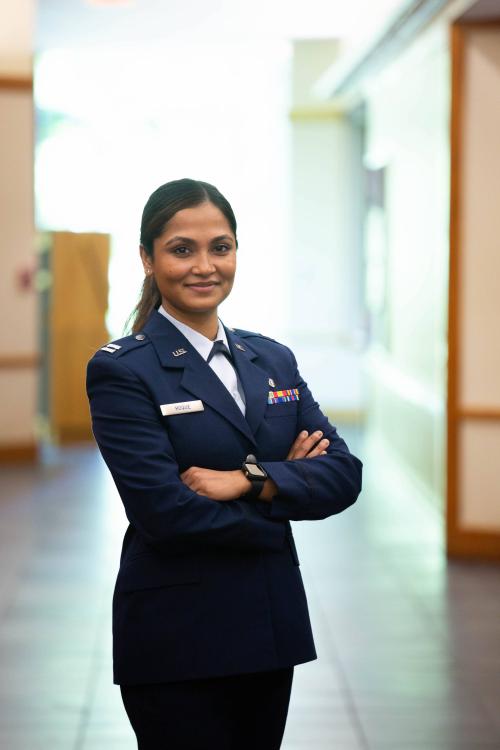
Capt. Nahima Hoque didn’t have any plans to join the U.S. Air Force when she first became interested in public health. “I had a very unconventional path to the military,” Hoque explains. After completing her master’s degree in Public Health, she joined AmeriCorps in New York City and jumped right into her career. However, that trajectory changed during her first year with AmeriCorps when she learned of a dynamic and diverse area of public health need: military public health.

Now with a doctorate in public health and a new commission as Public Health Commander in the Air Force, Hoque visited Sanford as a guest lecturer for Nathan Boucher’s “Introduction to the U.S. Healthcare System” class. A long-standing Sanford course, it also now serves as an introduction to Duke’s new Health Policy Certificate in a partnership between the Sanford School of Public Policy and the Duke Margolis Center for Health Policy, bringing together students from many different disciplines including medicine, ethics, economics, global health, and public policy, among others.
While sharing her story and addressing questions from students, Hoque gave an account of the inner workings of military public health: explaining how military bases work with local and regional public health officials, as well as how policies are scaled for the global needs of military personnel and their families.
“It’s different from civilian public health policies because in this role we need to make sure that members are mission capable and ready to deploy at any moment, and that deployment could be anywhere in the world. Every country has different health requirements, so we have to know everything from the immunizations needed to environmental health factors as well.”
As Hoque explained, that mission became even more difficult in 2020 due to the pandemic.
“I started in the Air Force just after COVID lockdowns started, and I can say that it raised awareness and resilience towards the current climate of public health. Every base partners with local experts and we are in constant communication about what is happening in the local communities around them. We share our health data with them as well,” Hoque said.
That collaborative experience is the very reason why Boucher invited Hoque to his class.
“You have students from all over Duke interested in health policy. In fact, some in Sanford courses are current or former members of the military,” Boucher explains. “Public health is always interconnected with other policy concerns, and I appreciate how Duke focuses on those connections as well.”
Public health is always interconnected with other policy concerns, and I appreciate how Duke focuses on those connections.
Nathan Boucher
Health Policy Certificate
Health policy works at the intersection of the delivery of health care to consumers and communities, and its effect on the economy, society, governments, and the private sector. Starting in the Fall 2022 semester, Duke undergraduates will have the opportunity to study health policy in a powerful and structured way that results in a Duke Undergraduate Health Policy Certificate.
